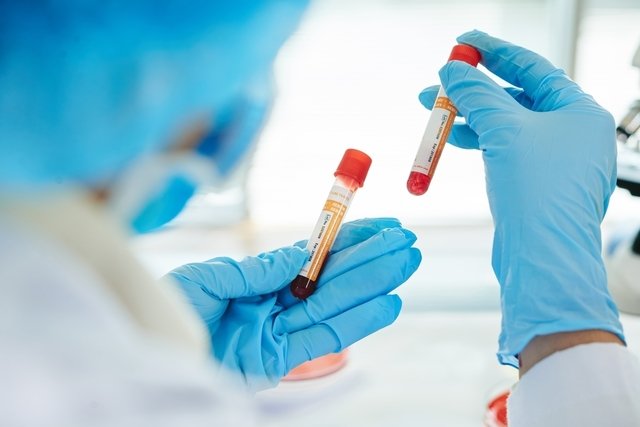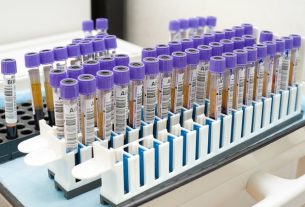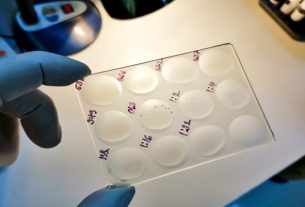Procalcitonin (PCT) is a marker of inflammation used mainly to help diagnose bacterial infections, to assess the risk of complications and the response to antibiotic treatment.
Procalcitonin is a precursor peptide of calcitonin, a hormone produced by the thyroid with the aim of regulating calcium levels in the body. However, in cases of infection, there is an inflammatory response in the body that increases the production of procalcitonin, with a peak of PCT in the blood being observed approximately 12 to 24 hours after infection.
The PCT dosage can be accompanied by other tests such as blood count, C-reactive protein (CRP), lactate dehydrogenase (LDH) and bacteriological tests.

What is procalcitonin used for?
The procalcitonin test is used to:
- Help in the diagnosis of bacterial infections;
- Assess the risk of complications;
- Assess the need to start or discontinue antibiotic treatment;
- Evaluate the response to treatment;
- Investigate the existence of co-infections.
3 to 6 hours after bacterial infection, there is an increase in procalcitonin levels, reaching a peak between 12 and 24 hours after infection, normally indicating that the bacteria has managed to spread through the bloodstream, characterizing sepsis. As the infection is fought, there is a progressive decrease in procalcitonin levels in the blood, with a halving of the PCT concentration observed every 24 hours.
Since procalcitonin levels do not increase when there is a viral infection, measuring this marker can be useful in the differential diagnosis of infections and assist in the diagnosis of co-infections, that is, infection by viruses and bacteria at the same time.
Procalcitonin from COVID-19
Procalcitonin dosage has been used in some cases of COVID-19, with the aim of investigating whether the person has any other bacterial infection. In other words, if in addition to the SARS-CoV-2 infection there is also an infection with bacteria, which can directly interfere with the person’s evolution, who may present more serious symptoms.
When performing the PCT after confirmation of COVID-19, the doctor can assess whether or not there is a need to start using antibiotics.
What does the result mean
Under normal conditions, procalcitonin levels in the blood are very low, normally below 0.05 ng/mL. In general, results from 0.1 ng/mL are indicative of infection.
The limit value considered by doctors may vary according to the objective of the examination and the disease investigated:
In general, it is recommended that the PCT dosage be repeated every 6 to 24 hours or, if antibiotics have been started, the recommendation is that procalcitonin be dosed 2 days after starting treatment.
Bibliography
- UNA-SUS. Procalcitonin may be useful for diagnosing bacterial infections in patients with COVID-19 admitted to intensive care units. Available at: <https://www.unasus.gov.br/especial/covid19/markdown/404>. Accessed on April 22, 2022
- THERMO FISHER. Understanding Procalcitonin. Available at: <https://www.thermofisher.com/procalcitonin/wo/en/understanding-procalcitonin.html?cid=0se_gaw_25052021_S24YWY>. Accessed on April 22, 2022
- THERMO FISHER. COVID-19 and Secondary Infections. Disponível em: <https://www.thermofisher.com/procalcitonin/wo/en/understanding-procalcitonin/pct-other-biomarkers/covid-19-assessment.html>. Acesso em 22 abr 2022
- CLELAND, DERRICK A.; ERANKI, AMBIKA P. Procalcitonin. 2022. Available at: <https://www.ncbi.nlm.nih.gov/books/NBK539794/#_NBK539794_pubdet_>. Accessed on April 22, 2022
- NOBRE, Vandack; BORGES, Isabela. Prognostic value of procalcitonin in patients with lower respiratory tract infections in the hospital setting. Rev Bras Ter Intensiva. Vol 28. 2 ed; 179-189, 2016

Sign up for our newsletter and stay up to date with exclusive news
that can transform your routine!
Warning: Undefined array key "title" in /home/storelat/public_html/wp-content/plugins/link-whisper-premium/templates/frontend/related-posts.php on line 12
Warning: Undefined array key "title_tag" in /home/storelat/public_html/wp-content/plugins/link-whisper-premium/templates/frontend/related-posts.php on line 13



